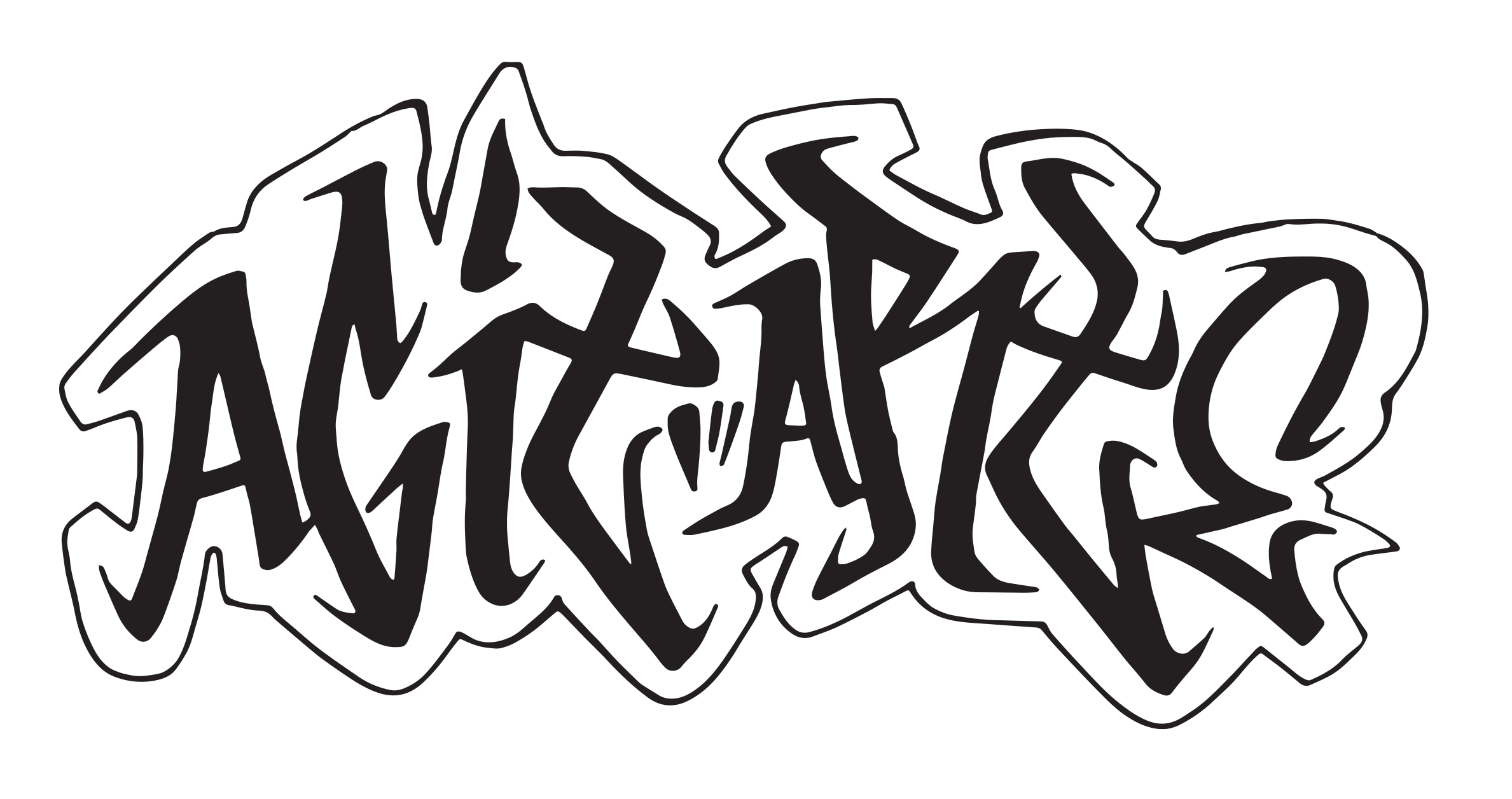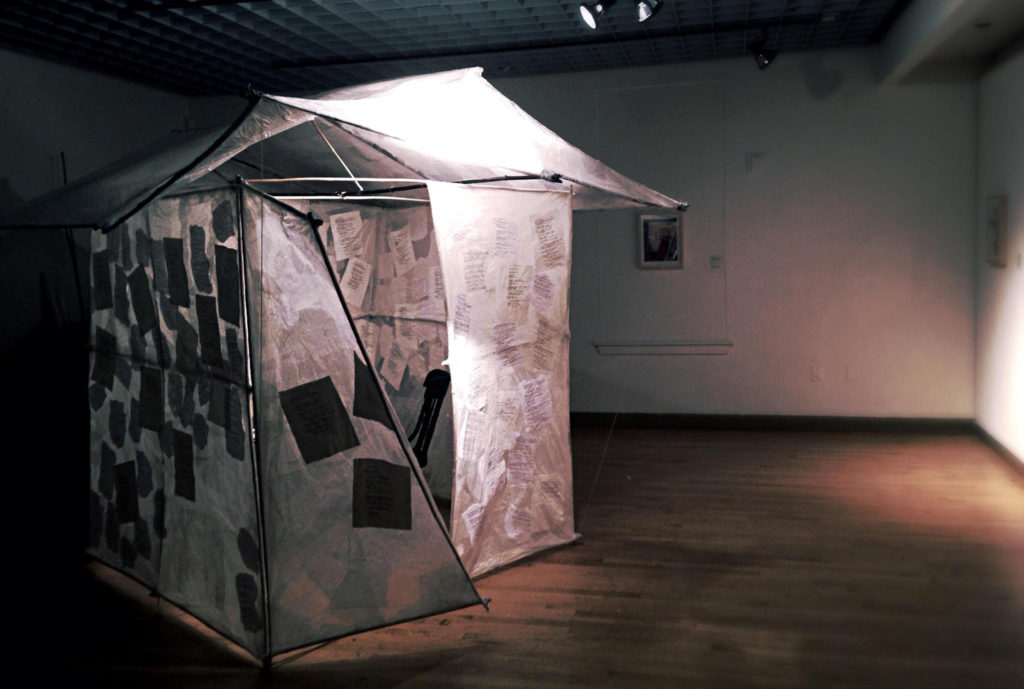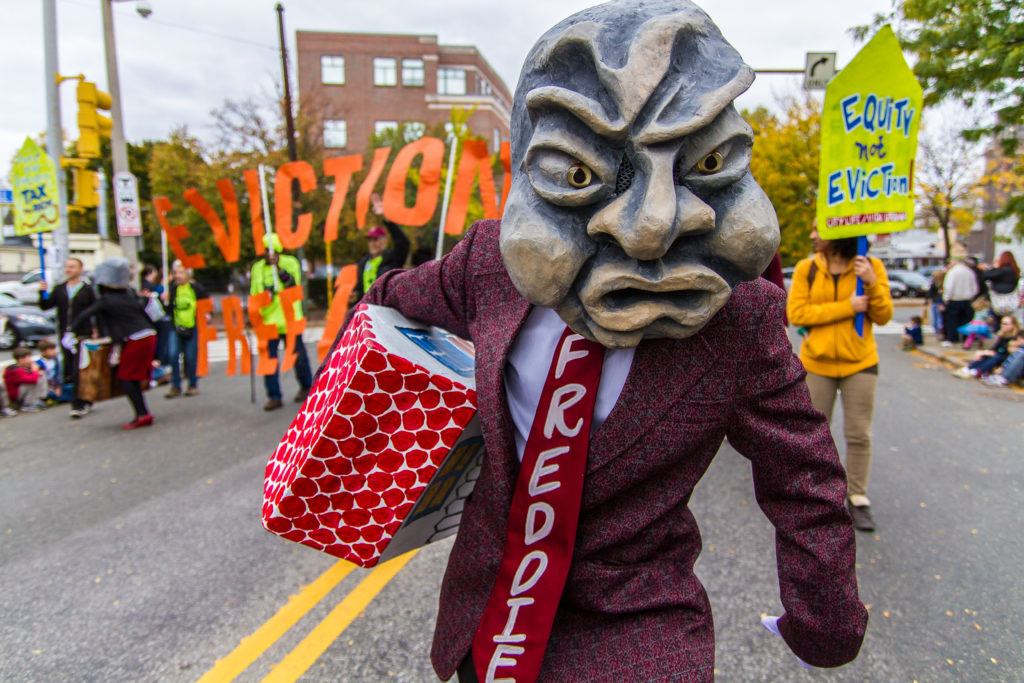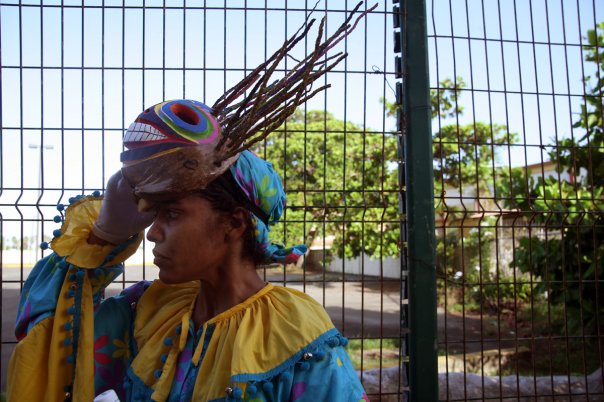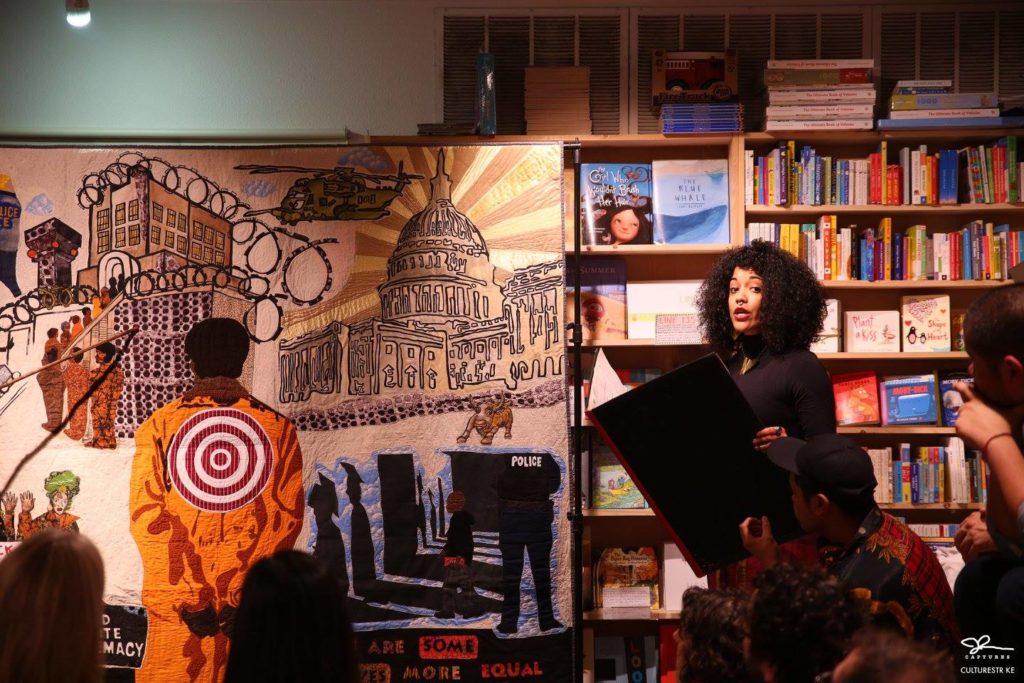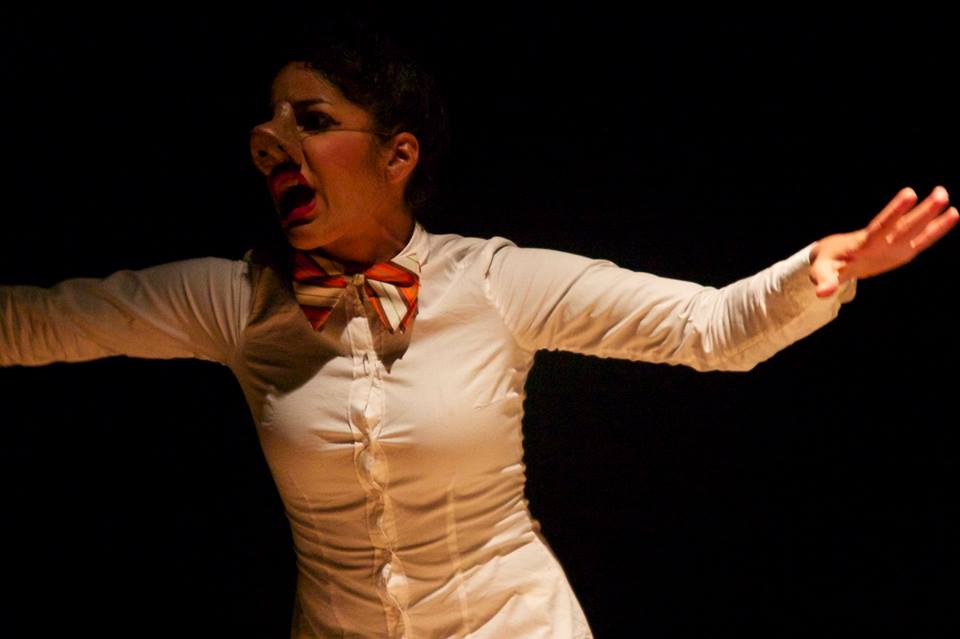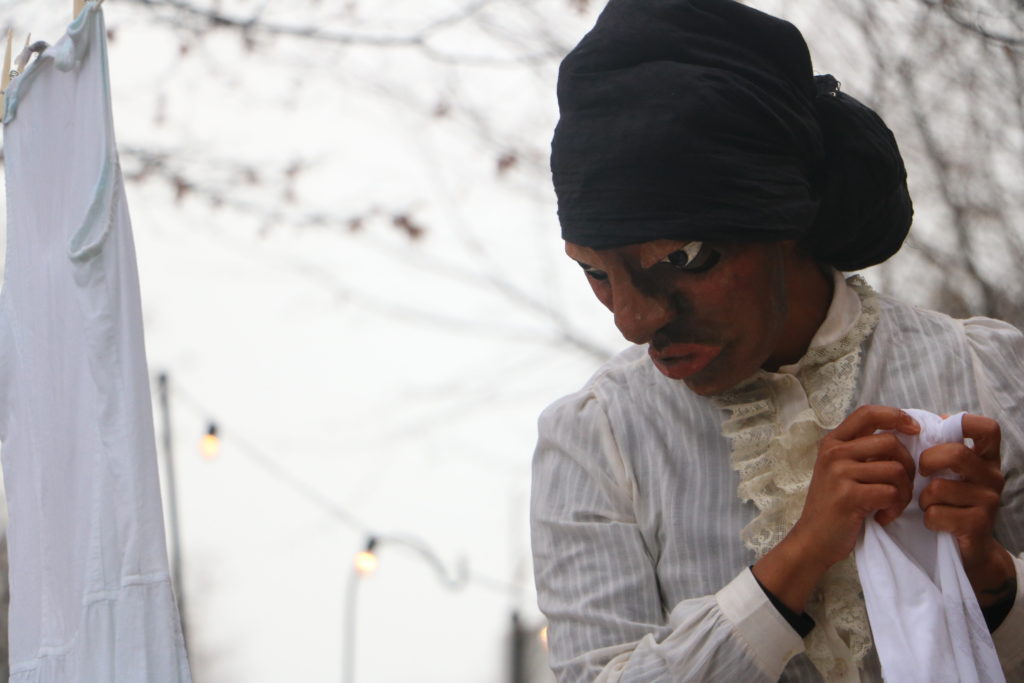Published April 2018

AgitArte: How did you first become engaged with AgitArte?
Dey: I came to a Papel Machete workshop/build around the time when just a few members identified as artists. I believe this was early in 2008. Jorge Díaz, AgitArte’s Founder and Artistic Director, and I met and after a conversation of art and puppetry we visited the workshop of the political puppet theater project he founded and directed at the time, Papel Machete. I had seen Jorge perform and was impressed by his puppetry skills and the seriousness (even though handled with humor) of the themes he presented in his table-top puppetry show in “Sobre La Mesa,” by Maskhunt Motions. I was intrigued and wanted to hear more about the work and the theater collective.
At the time, the workshop was just a small room and some space on his balcony. The night I showed up they were building puppet shows about different political issues and historical figures of Puerto Rico. Rocío, a teacher who was developing a toy theater piece around the 2008 teacher’s strike for Federación de Maestras de Puerto Rico (FMPR) asked me to help her build a few tridimensional objects for the show.
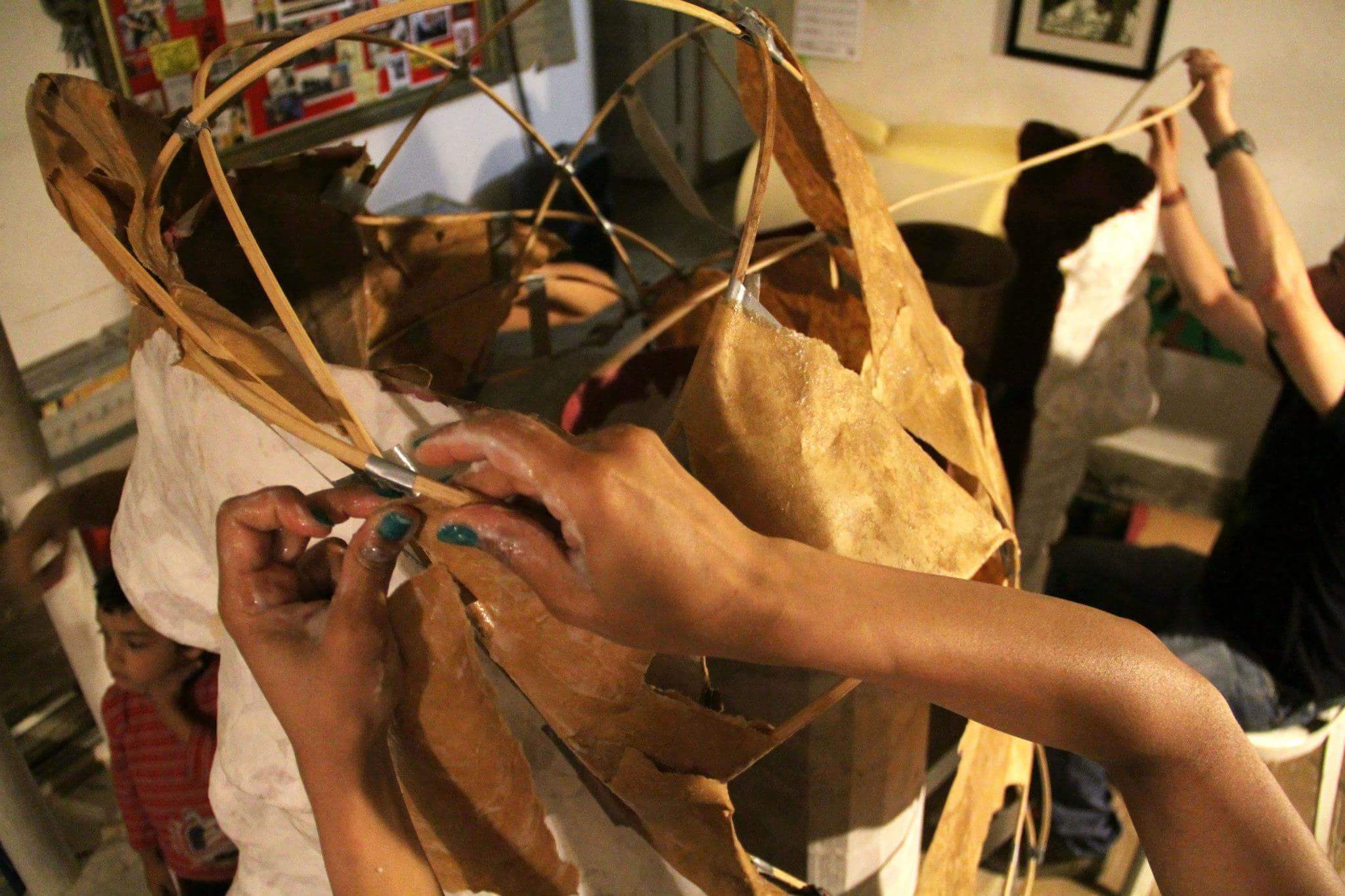
Around that time, I was in graduate school finishing my thesis work in Architecture. Most of my time was spent between books, thriving with artmaking was a breath of fresh air! My architectural skills found a home in Papel Machete and after that night of working with Rocío, I was formally a builder with the group. The radical political conversations were a constant, often uncomfortable, but all the interactions certainly forged a new consciousness which Jorge says is natural, referring to how I was able to develop it organically based on my experiences and practice.
I became more familiar with Papel Machete’s theatrical work which centers people of color, working class, and marginalized communities. I finally felt like I had found a place where I was able to grow both artistically and politically in praxis, and learn about the solidarity work which has been a part of grounding AgitArte’s collaborative work.
After many art builds and performances, both in alternative theatrical spaces and in the streets, Jorge invited me to co-design and build a workshop around an anti-foreclosure campaign in Boston, MA in 2010. The workshop was a collaborative process with City Life/Vida Urbana.
I think that nothing else could have prepared me for the sometimes chaotic, ever-changing and always beautiful journey that ensued in the following years, than the work and the relationships built in Papel Machete | AgitArte. My political education, cultural organizing strategies, everything I know about performance and theater in praxis, the love and commitment I have for this work, I owe it to them and to my mentor and beloved compa, Jorge Díaz.

AgitArte: What is your creative background, both in education and through other means of developing your artistic practice(s)?
Dey: Before Architecture School, I studied Humanities in the University of Puerto Rico. By that time, a major in Fine Arts through a humanistic lens meant that we were exposed to different disciplines and media such as language, literature, philosophy, history, graphic design, sculpture, painting, etc. Later, that led me to explore the University of Artes Plásticas in Old San Juan as “estudiante libre.”
Soon after that I decided to go back to school, this time embracing architecture as the discipline that changed my worldview particularly in regards to art in a social context. Architecture as a social practice, as community endeavor, as a cultural object, as a way of interpreting body and space, sound and dimension was my first love. While in graduate school, I team-taught in undergraduate settings with two mentors, mostly in architectural theory and community design studios.
In January 2012, I joined the Puerto Rican Diaspora searching for work opportunities as the political and economical situation back home remained uncertain. The experience as an educator/facilitator of processes opened new doors for me and I ended up in K-8th grade classrooms in Boston. I have experienced the power of the creative process as a teaching artist. As a facilitator, I focus on various disciplines: Spanish through the Arts, theater/puppet-making, woodworking, etc. Issues of race, identity, language, and community are fundamental to my work.
AgitArte: What do you feel you’ve gained as an artist through your work with AgitArte? And in this same light, what do you feel have been your greatest contributions to AgitArte?
Dey: I’ve had the opportunity to simultaneously learn and lead as a co-designer and facilitator of art builds and cultural workshops designed to be intersectionality and intergenerationally inclusive of the communities that AgitArte is called into. I’ve brought my architectural background focusing in design as problem solving, visioning and understanding of the tridimensional to every opportunity we have to engage in the new. I also think that resilience is a trait that I carry throughout my blood. But improvisation is a skill that definitely street performance has sharpened.
As a resident artist with AgitArte, I directed and curated the art of the book, When We Fight, We Win!, co-authored with Greg Jobin-Leeds. My intention was to both introduce the readership to visionary artists who are accountable to their community and to acknowledge the labor that goes into culture-making. I centered artists of color, particularly those representing the most marginalized communities, who are at the front lines of these movements and often go unnoticed. I specifically selected the artists committed to lifting up these counter-narratives in their communities in ways that proved transformative. In the creation of the book, my contribution was insight and rigorous research, and I gained in relationships and a broader perspective of movement building through culture.
The book tour was definitely a highlight in the process of building and strengthening relationships for collaborative work we are now building with other organizations, like Southerners on New Ground (SONG) and artists. Our relationship with SONG has given life to new projects and collaborations, such as the Issue of The Change Agent featuring When We Fight, We Win! and the development of Cantastorias for SONG’s community organizing work.
Throughout my more than eight years with AgitArte | Papel Machete, I’ve been able to grow as a cultural worker and performer. Cultural work is a beautiful dance with the uncomfortable. Our work not only supports campaign organizing work and actions, but imagines new narratives and language in which we can see ourselves as creators of our futures. But it also digs the dirt for truth…In the process we raise the main political issues, contradictions and limitations of our society. Critique is essential to develop a collective consciousness to counter hegemonic discourses. We thrive on love, as we recognize this work is for the long haul, we nurture the relationships we forge through our cultural organizing work.
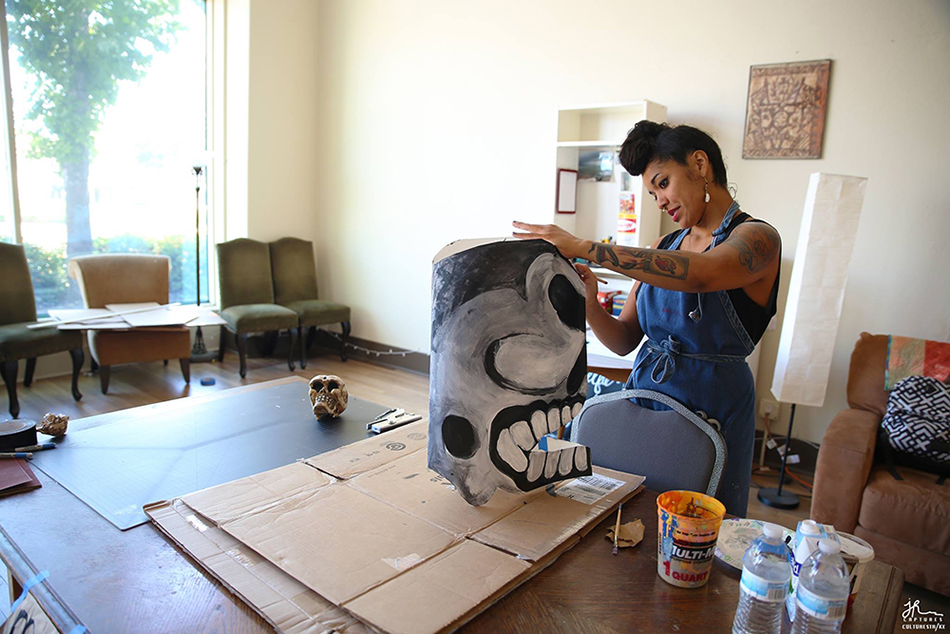
AgitArte: As you know and have been a major part of, creative storytelling is crucial part of AgitArte’s work. Can you share one or two stories of your work with AgitArte that have been especially meaningful to you and/or have helped shape your development as an artist?
Dey: Storytelling is a way of resisting hegemony and to preserve culture but it is also a way of changing culture. There’s a story that I hold close to my heart because it encompasses both. It’s the story of “El barrio del Mangó Bajito” (2010), a toy theater piece we created about a mango tree in our gentrified neighborhood of Santurce whose fruit was lost every season due to privatization and speculation of the land. As puppeteers, we noticed that in most of our presentations there were a lot of kids and our pieces were not developed for that audience. We wanted to create a piece that exposed the principles of private property and how this relates to class struggle in a way that kids were able to understand.
The show was conceived as a big “pop-up” book serving as the stage to narrate the story of a community and a mango tree in which stories are interrelated. Through the story we discover a real estate developer from the U.S. (a clear reference to our colonial status with the U.S.) who’s excited about the possibility of capitalizing on the land and the fruits of its labor. From this context, the narrative develops as the story of a community that fights back against gentrification, displacement and exploitation.
Although the narrative is a mirror to what our communities experience: a neighborhood stricken by violence and poverty where developers see an opportunity to jumpstart their capitalist development, in the story the community organizes, resists, and decides what they want and need for their community. Each character has a special power, sometimes supernatural, as a result of the constant “experimenting” the U.S. has done on Puerto Rican people and land, others as a consequence of the resilient nature of the working class which struggles to survive in a capitalist society.
The piece was first performed in 2010 in the 9th Toy Theater International Festival in St. Ann’s Warehouse in DUMBO, Brooklyn, New York. Later we performed it at the Brecht Forum in NYC and at the Boston Teacher’s Union School in Massachusetts and Papel Machete’s 5th Anniversary show at La Respuesta in Santurce, Puerto Rico.
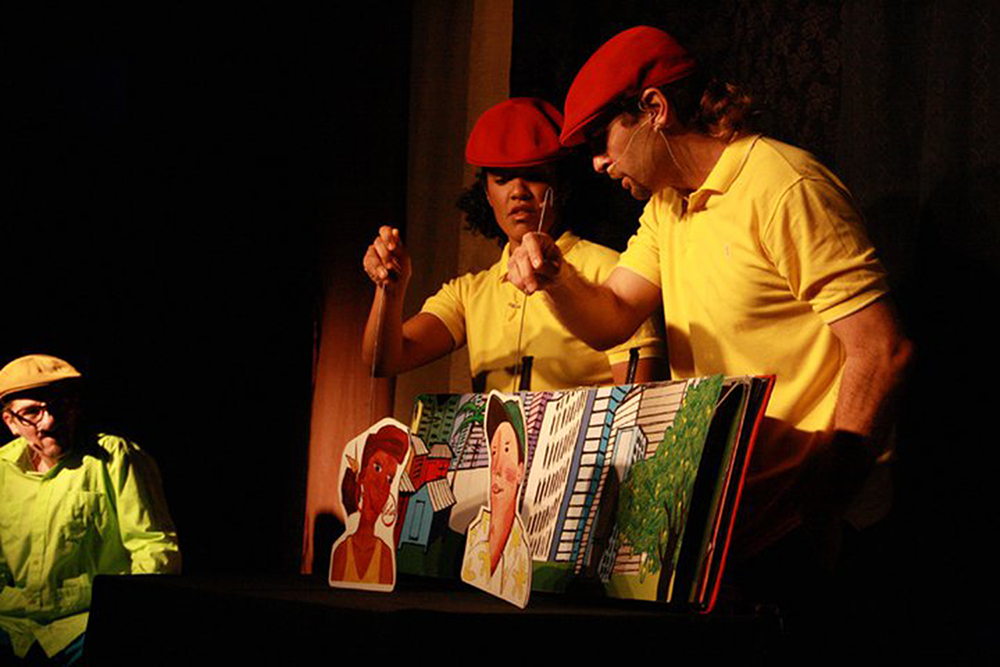
AgitArte: What’s next for you and your work with AgitArte? What upcoming projects are you most excited for and why?
Dey: Building on the success of the relationships generated through When We Fight, We Win! I’m working on a second quilt with Brooklyn Quilt Girl, Sylvia Hernández for a cantastoria based on the platform by The Movement for Black Lives delineated in response to violence against Black communities throughout the U.S. and the world.
As working class black feminist Puerto Rican women producing art from these intersectionalities, my colleague Sugeily and I will be working on a “desmonte teatral” to frame the creative process, content and aesthetics of our cultural work. We are also hoping to raise money to publish El Barrio del Mangó Bajito as a children’s book.
Looking at the broader picture, I envision creating a movement sanctuary/organizing space here in the United States, focused on cultural workers and healers, as a strategy against displacement and gentrification and in connection with our space in Santurce, to generate cultural exchanges and popular education and action.
DEY’S PROJECTS
“DEY HAS BEEN INSTRUMENTAL IN EVERY CREATIVE PROCESS SINCE SHE STARTED WORKING WITH US IN 2008. HER RESEARCHING, DESIGNING, FACILITATING, BUILDING, VISIONING AND PERFORMING SKILLS ARE CRUCIAL TO THE PROJECT’S CREATIVE CAPACITY. SKILLS WHICH DEY HAS CONTINUED TO DEVELOP PARALLEL TO HER CRITICAL CONSCIOUSNESS IN OUR POPULAR EDUCATION EFFORTS, RADICAL THEORY AND TRANSFORMATIONAL PRACTICE.”
– José Jorge Díaz, Founder & Artistic Director
MORE ON DEY
Feministing.com | THE FEMINISTING FIVE: DEY HERNÁNDEZ
Democracy Now! | When We Fight, We Win: New Book Showcases Social Movements & Activists Transforming the World
The Loisaida Center | “La Casita de Julia” Installation by Dey Hernández Vázquez
